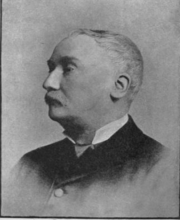
Edward Dutton Cook
Encyclopedia
 Edward Dutton Cook was an English
Edward Dutton Cook was an EnglishEngland
England is a country that is part of the United Kingdom. It shares land borders with Scotland to the north and Wales to the west; the Irish Sea is to the north west, the Celtic Sea to the south west, with the North Sea to the east and the English Channel to the south separating it from continental...
dramatic critic
Critic
A critic is anyone who expresses a value judgement. Informally, criticism is a common aspect of all human expression and need not necessarily imply skilled or accurate expressions of judgement. Critical judgements, good or bad, may be positive , negative , or balanced...
and author
Author
An author is broadly defined as "the person who originates or gives existence to anything" and that authorship determines responsibility for what is created. Narrowly defined, an author is the originator of any written work.-Legal significance:...
.
Cook's father was George Simon Cook of Grantham, Lincolnshire, a solicitor
Solicitor
Solicitors are lawyers who traditionally deal with any legal matter including conducting proceedings in courts. In the United Kingdom, a few Australian states and the Republic of Ireland, the legal profession is split between solicitors and barristers , and a lawyer will usually only hold one title...
, of the firm of Le Blanc & Cook, 18 New Bridge Street, Blackfriars, London, who died on 12 September 1852, leaving a family of nine children.
Edward Dutton, the second son, was born at 9 Grenville Street, Brunswick Square, London, on 30 January 1829. At the age of six he went to a school kept by a Miss Boswell at Haverstock Hill, was removed to another school at Bradmore House, Chiswick, and finally, about 1843, entered King's College School. Having completed his education, he was articled to his father, and remained in his office about four years, when he obtained a situation in the Madras Railway Company's office in New Broad Street, city of London, and in his spare time followed his artistic and literary tastes.
As soon as he was able to do so he left the railway company and devoted himself entirely to literature as a profession. Having studied painting under Rolt, and learned engraving, he at one time sought employment on Punch
Punch (magazine)
Punch, or the London Charivari was a British weekly magazine of humour and satire established in 1841 by Henry Mayhew and engraver Ebenezer Landells. Historically, it was most influential in the 1840s and 50s, when it helped to coin the term "cartoon" in its modern sense as a humorous illustration...
as a draughtsman on wood. In 1859 he became a member of the Artists' rifle corps, and also a member of the Ramblers' Club, which met every night from November to May at Dick's Tavern, 8 Fleet Street. About this period, in conjunction with Mr. Leopold Lewis, he wrote a melodrama entitled The Dove and the Serpent, which was produced with much success, under Mr. Nelson Lee
Nelson Lee
Nelson Lee is a Taiwanese born Canadian actor who co-starred in the only season of Blade: The Series as Shen, Blade's sidekick and technical support. He also starred in Oz , as inmate Li Chen, and in some episodes of Law & Order.-Selected filmography:-External links:* *...
's management, at the City of London Theatre.

Pall Mall Gazette
The Pall Mall Gazette was an evening newspaper founded in London on 7 February 1865 by George Murray Smith; its first editor was Frederick Greenwood...
, and from that date to his death to the World newspaper. He was the writer of numerous articles on art topics in various reviews, newspapers, and periodicals, and the author of many works of fiction. Of the latter, Paul Foster's Daughter, his first work, served to establish his reputation, and the production of The Trials of the Tredgolds in the following year (1862) in Temple Bar was a great literary success. His later novels did not maintain the popularity which his earlier works achieved. This was from no lack of merit, but because he was not sufficiently sensational in his style to suit the spirit and fashion of the period. He was one of the contributors to the Dictionary of National Biography
Dictionary of National Biography
The Dictionary of National Biography is a standard work of reference on notable figures from British history, published from 1885...
, and furnished the dramatic and theatrical lives in letter A to the first and second volumes.
He died suddenly of heart disease on 11 September 1883, and was buried in Highgate cemetery on 15 September.
On 20 August 1874 he married Linda Scates (second daughter of Joseph Scates), a pupil of the Royal Academy of Music and a well-known pianist, by whom he left one daughter, named Sylvia after the heroine of her father's first novel.
Works
- Paul Foster's Daughter 1861
- Leo 1863
- A Prodigal Son 1863
- The Trials of the Tredgolds 1864
- Sir Felix Foy, Bart. 1865
- Hobson's Choice 1867
- Dr. Muspratt's Patients, and other Stories 1868
- Over Head and Ears 1868
- Art in England, Notes and Studies 1869
- Young Mrs. Nightingale 1874
- The Banns of Marriage 1875
- A Book of the Play: Studies and Illustrations of Histrionic Story, Life, and Character 1876, three editions
- Doubleday's Children 1877
- Hours with the Players 1881
- Nights at the Play, a view of the English Stage 1883
- On the Stage: Studies of Theatrical History and the Actor's Art 1883
External links
- Dutton Cook biography on "Victorian Popular Novels" site

